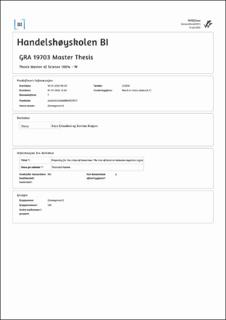Preparing for the crises of tomorrow: The role of balance between cognitive styles : A quantitative study of the explanatory power of balance between cognitive styles on task performance in a simulated crisis management setting
Master thesis
Permanent lenke
https://hdl.handle.net/11250/3037323Utgivelsesdato
2022Metadata
Vis full innførselSamlinger
- Master of Science [1621]
Sammendrag
In this thesis we sought to explore the extent to which balance between cognitive styles explains variation in task performance in a simulated crisis management setting. We conducted a quantitative study with a sample consisting of 107 participants. Our findings revealed that individuals scoring medium-medium on intuitive and analytic style did not perform as well as the other balanced combinations, high-high and low-low. However, as our simple slope analysis contained two insignificant slopes, no firm conclusions could be drawn. Moreover, a directional difference score was created as a quantification of balance between cognitive styles, and its relationship with task performance was a negative quadratic regression equation with a maximum value at approximately d=0. This supports the predictive validity of balance between cognitive styles on task performance, and further suggests the most advantageous balance to be a near perfect balance between intuitive and analytic cognitive style. Lastly, the squared directional difference score was a significant predictor of task performance, and in addition to control variables, found to explain 35% of the variance in task performance. The model containing the interaction term, rather than the squared directional difference score, did, however, explain 2% more of the variance. Furthermore, balance between cognitive styles seem to explain almost all of the variance explained by the interaction term, with 4% and 5% respectively. These results have practical implications on recruitment and selection practices in crisis management settings, in addition to potential theoretical implications regarding the medium-medium combination, and whether the quantification of balance aligns with a dual-process perspective. As such, our findings indicate that taking a step forward requires us to take two steps back to reassess the basics of balance between cognitive styles.
Beskrivelse
Masteroppgave(MSc) in Master of Science in Leadership and Organizational Psychology - Handelshøyskolen BI, 2022
